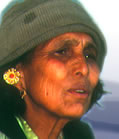 |
 |
||
 |
|||
|
RELATED THEMES gender migration social relationships OTHER LOCAL THEMES BACKGROUND |
family life
Marriage is clearly undergoing change, with the result that various practices now co-exist. One woman insists that "marriage is not a must", while increasing numbers of young people are making their own choice of marital partner. The forced marriage of young girls, once common, is said to be a thing of the past: "Nowadays they can't force like that.. Now girls are also aware of the law. If somebody forces them they are able to protest" (Nepal 11). Another says: "[Women] must be allowed to marry according to their own choice.... Even the constitution allows them to decide on their own" (Nepal 9). Several older women talk with great sadness of their own lack of choice over a marriage partner. There is some suggestion in one area that the exodus of girls to India to become prostitutes had a significant impact on community and family life, resulting in a shortage of girls of marriageable age and thus a tendency for boys to secure a partner by marrying early. According to narrators, re-marriage is acceptable among Tamangs but not Chettris or Brahmins. One says a dowry system is practised among Bahuns and Chettris but not among Tamangs. There is concern that dowry demands are rising and that families are often forced to sell belongings to raise sufficient dowry: "We have advised girls not to go with boys who demand dowry. They should rather stay with their parents and brothers at their parental home. Likewise, we have advised families not to sell their belongings in order to have their girls married," says one woman (Nepal 9). She suggests: "To eradicate this capitalist culture, a committee on marriage matters should be set up and it should decide to what extent the dowry would be demanded" (Nepal 9). The powerful position of in-laws is referred to by several female narrators; one complains that some women are dependent on their in-laws for money to buy essential goods since men keep the money they earn. In one of the new interviews a woman says inter-caste marriage is now more acceptable, though the couple will not be allowed near the family god (Nepal 31). quotes about family life"Once the parents wished it, then we had to marry, whether [the groom] had goitre [or is] old, lame. Once parents liked the boy. girls had no choice, [no way] of saying I don't want to marry him, don't want to go. In my case marriage was done that way. Otherwise, as I have already said, why would I have ever married and come to this troublesome place? Now that practice is no more, it is a matter of consent. Now when I think about myself it is painful... I feel sad." "First we go to ask for girls and we fix the date, if everything goes according to plan. Then we take Janti from the boy's side and go to bring the girl. When we go to ask for the girl, we have to take Janrd in a small ghempo (pot) and have to talk with the girl's parents. We will take Janti there and bring the bride home and give food to all our relatives and villagers. Then after the marriage we have to take the bride to her home. At that time we have to take three or four small ghempo of Rakshi and three or four small ghempo of Janrd with the bride." "In the olden days wherever they saw girls they would put (grab?) them and take them with them. It was a bad thing. Because many girls were small. When they took small girls, poor things, they would die of fear.... Nowadays we don't have that kind of custom. Not for three or four years now.... If a girl doesn't like a boy, or if a boy uses force to marry her, then the law will catch him." "First, my brothers dragged me and carried me, as if they were giving a chicken and then they were again sent to fetch me, so they grabbed me, like a leopard grabbing a pig, and brought me home. Then they ... officially married me." "And elders in olden times were not like our types. If they saw daughters and daughters-in-law sitting idle for a moment they would come forward to rebuke us, asking how we dared to stay inside the house lolling around and expect to eat what they had [harvested and] stored? Elders of olden times worked very hard also and used to say, 'We cannot tolerate people remaining idle for a moment. they loll around at home and still get to eat on wealth that we gathered through hard work'." |
|